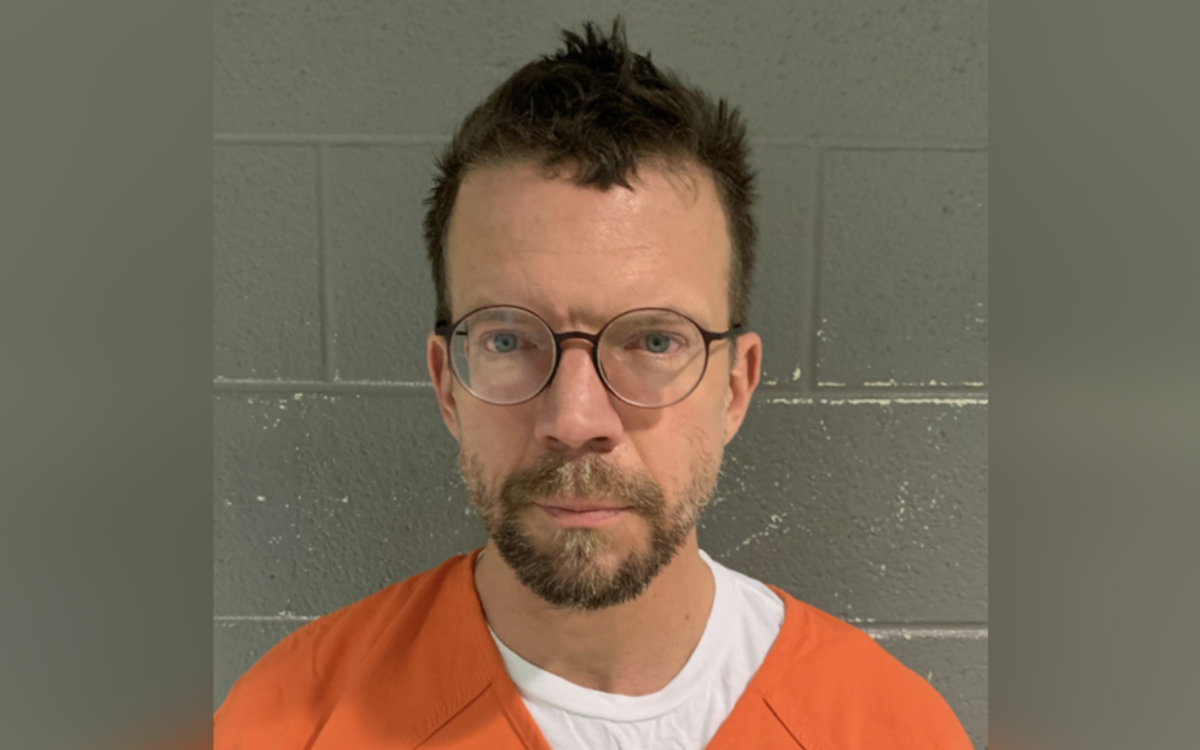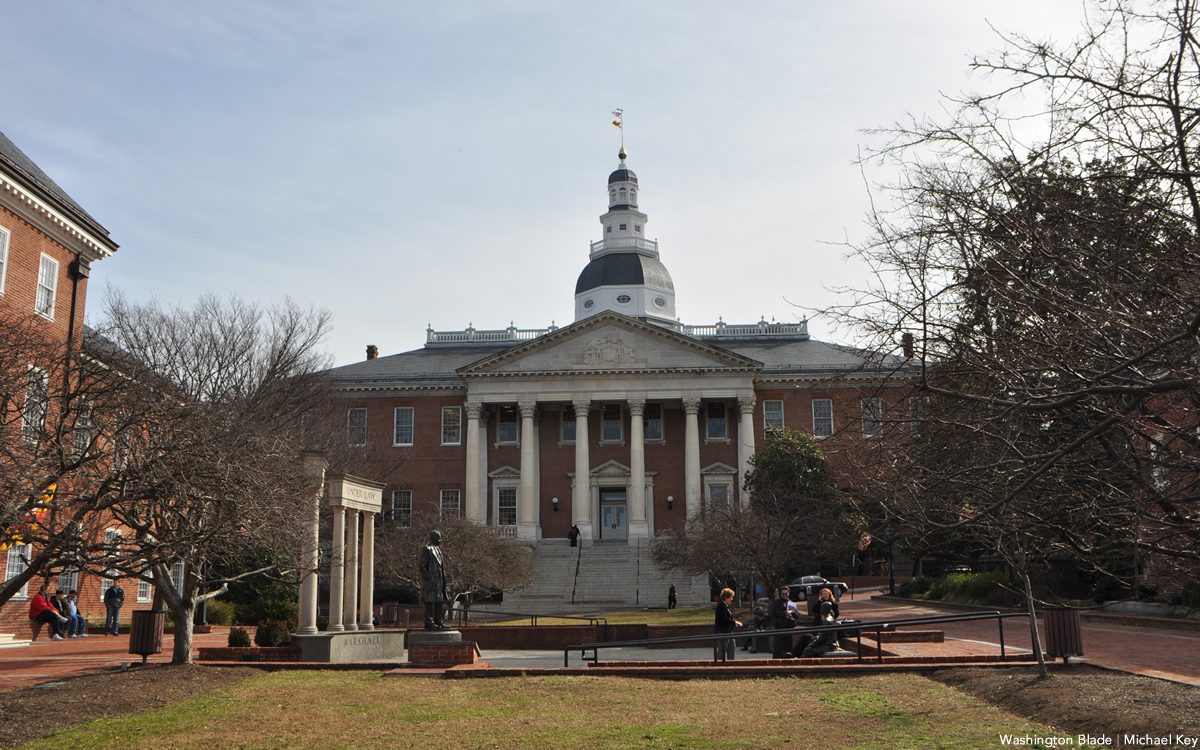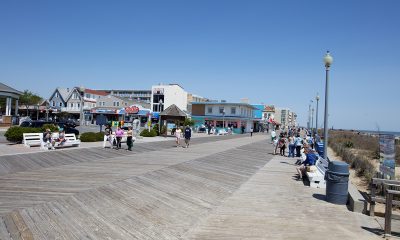Maryland
Gay former College Park mayor sentenced to 30 years in child porn case
Family, friends testify at emotional sentencing hearing in P.G. County

A Prince George’s County Circuit Court judge on Monday, Nov. 20, sentenced gay former College Park Mayor Patrick Wojahn to 30 years of incarceration at an emotional three-and-a-half-hour long sentencing hearing that took place more than three months after Wojahn pleaded guilty to 140 counts of child pornography-related charges as part of a plea agreement with prosecutors.
In agreeing to carry out the plea agreement, Judge Karen Mason sentenced Wojahn to 150 years in prison, with 120 years suspended, requiring that he serve 30 years.
The judge and prosecutors pointed out that under Maryland’s sentencing rules Wojahn will be eligible to apply for release on parole after serving 25 percent of the 30-year sentence, which could result in his release after seven and a half years.
The sentencing followed news that surfaced in March of this year, which shocked Wojahn’s friends and longtime political supporters, that he had been arrested after police raided his College Park home and confiscated multiple cell phones, a tablet, computer, and a storage device containing video and still images, leading to two indictments alleging possession and distribution of child pornography.
The 140 counts to which he pleaded guilty include 60 counts of distribution of child porn, 40 counts of possession of child porn, and 40 counts of possession of child pornography with intent to distribute it.
He announced his resignation as mayor, a position he held since 2015, shortly before his arrest.
Wojahn’s husband, mother, sister, and 13 friends testified at the sentencing hearing. Most told the judge they understood the seriousness of the charges against their loved one and friend but called on the judge to take into consideration the good that Wojahn has done as a family member, friend, and elected official over his lifetime. Several of the friends said mental health issues and an addiction problem had played a role in Wojahn’s actions and urged the judge to arrange for him to receive mental health related services.
Among those who testified were Sister Jeannine Gramick, a Roman Catholic nun who co-founded the LGBT Catholic support organization New Ways Ministry, and Francis DeBernardo, the current executive director of New Ways Ministry. Also testifying was Thomas Bower, an official with the LGBT Catholic organization Dignity Washington, of which Wojahn has been a participant.
Judge Mason said she would refer Wojahn, who has been held without bond since the time of his arrest in March of this year, to the Patuxent Institution, a maximum-security correctional facility located in Jessup, Md., that specializes in providing mental health services for its male and female inmates.
Mason also included in her sentencing a requirement that Wojahn serve five years of supervised probation upon his release from incarceration, register as a sex offender, and have no unsupervised contact with minors.
The testimony from family members and friends came after P.G. County Assistant State’s Attorneys Jessica Garth and Monica Meyers argued that those who possess and distribute child pornography are responsible for the suffering of victims of child sex abuse who are forced to take part in the production of child porn video and still images, even though, as in Wojahn’s case, the perpetrators do not produce the images and don’t directly come into contact with the children depicted in the images.
Police and prosecutors have alleged in charging documents that Wojahn had uploaded and/or shared dozens of videos or still images on the social media app Kik depicting explicit sexual acts between adult men and prepubescent boys, depicting prepubescent boys engaging in sex with each other, or engaging in masturbation.
In a development that surprised some attending the sentencing hearing, the two prosecutors disclosed that with the help of law enforcement officials and the National Center for Missing and Exploited Children, they identified 52 of the juveniles who were depicted in the video or still photo images that police had confiscated from Wojahn’s home. At a press conference following the sentencing hearing, prosecutor Meyers said the 52 then children who were identified, most of whom are now adults, were from the U.S., Canada, Mexico, and several European countries, including Germany, Russia, Portugal, and the United Kingdom.
Through information obtained from law enforcement officials in the U.S. and internationally, the two P.G. County prosecutors said they obtained statements from or case reports for about 42 of the individuals listed as victims and presented those statements at the sentencing hearing by projecting them on two large screens in the courtroom. Meyers read each of the statements as they were projected, with most of the victims saying they suffered long-lasting harmful effects from being forced as children to take part in the production of pornographic images.
Meyers said while prosecutors presented victim impact statements for about 40 of the juveniles who were identified in the porn videos and still images, Wojahn had possession and helped to distribute images of “hundreds more on his devices” who were not identified.
In an effort to highlight the large numbers of sexually abused juveniles in the videos or still images in Wojahn’s possession, Meyers pointed to a photo that the prosecutors displayed on the large video screen in the courtroom during Monday’s sentencing hearing of a junior high school in College Park located near where Wojahn lived.
“That his own elementary school a half a mile from his house has less than 500 students who attended, he had more victims than that on his telephone,” Meyers said at the press conference. “And on his device, he had memorialized more than 500 victims who were sexually abused, raped, and tortured,” she said.
“These are not victimless crimes, even though the victim is separated from the person who’s abusing them by a computer screen,” Assistant State’s Attorney Garth said at the press conference. “They are real people. They experience real damage, psychological and physical damage,” she said. “And they have to live with what happened to them for the rest of their lives.”
P.G. County State’s Attorney Aisha Braveboy, who called the press conference, thanked the team of prosecutors and police investigators who worked on the Wojahn case.
“No child deserves to be sexually abused,” Braveboy said. “No child deserves their images to be displayed on the internet or any platform for hundreds of thousands and possibly millions of people to view,” she said. “And so, in accepting this plea agreement, we are satisfied that Mayor Wojahn understood the seriousness of his actions and wanted to take responsibility.”
Wojahn, who was dressed in an orange prison jumpsuit, was the last to speak at the hearing before Mason issued her sentence. Due to the fact that Wojahn and many of the others who spoke at the hearing were not using microphones, much of what was said could not be heard clearly.
“I want to give an apology,” he could be heard saying. “I don’t know what happened. I can’t explain what changed me,” he continued, weeping while speaking. “I want to apologize to all my friends. I apologize to my family,” he said. He then turned to look at his husband, Dave Kolesar, and expressed his love for his husband. Both were crying as Wojahn spoke.
“I hope what I went through will help others who need help, get help,” he said. “I do hope I will be able to recover fully myself. I hope others will know recovery is possible.”
Wojahn’s attorney, David Moyse, pointed out that Wojahn had cooperated fully with the investigation into his actions as soon as P.G. County police entered his house with a search warrant in March. Much of what Moyse said couldn’t be heard due to the faulty sound system in the courtroom, but he urged the judge to take into consideration all the positive aspects of Wojahn’s life.
Maryland
4th Circuit dismisses lawsuit against Montgomery County schools’ pronoun policy
Substitute teacher Kimberly Polk challenged regulation in 2024

A federal appeals court has ruled Montgomery County Public Schools did not violate a substitute teacher’s constitutional rights when it required her to use students’ preferred pronouns in the classroom.
The 4th U.S. Circuit Court of Appeals in a 2-1 decision it released on Jan. 28 ruled against Kimberly Polk.
The policy states that “all students have the right to be referred to by their identified name and/or pronoun.”
“School staff members should address students by the name and pronoun corresponding to the gender identity that is consistently asserted at school,” it reads. “Students are not required to change their permanent student records as described in the next section (e.g., obtain a court-ordered name and/or new birth certificate) as a prerequisite to being addressed by the name and pronoun that corresponds to their identified name. To the extent possible, and consistent with these guidelines, school personnel will make efforts to maintain the confidentiality of the student’s transgender status.”
The Washington Post reported Polk, who became a substitute teacher in Montgomery County in 2021, in November 2022 requested a “religious accommodation, claiming that the policy went against her ‘sincerely held religious beliefs,’ which are ‘based on her understanding of her Christian religion and the Holy Bible.’”
U.S. District Judge Deborah Boardman in January 2025 dismissed Polk’s lawsuit that she filed in federal court in Beltsville. Polk appealed the decision to the 4th Circuit.

By PAMELA WOOD | Dan Cox, a Republican who was resoundingly defeated by Democratic Gov. Wes Moore four years ago, has filed to run for governor again this year.
Cox’s candidacy was posted on the Maryland elections board website Friday; he did not immediately respond to an interview request.
Cox listed Rob Krop as his running mate for lieutenant governor.
The rest of this article can be found on the Baltimore Banner’s website.
Maryland
Expanded PrEP access among FreeState Justice’s 2026 legislative priorities
Maryland General Assembly opened on Jan. 14

FreeState Justice this week spoke with the Washington Blade about their priorities during this year’s legislative session in Annapolis that began on Jan. 14.
Ronnie L. Taylor, the group’s community director, on Wednesday said the organization continues to fight against discrimination against people with HIV/AIDS. FreeState Justice is specifically championing a bill in the General Assembly that would expand access to PrEP in Maryland.
Taylor said FreeState Justice is working with state Del. Ashanti Martinez (D-Prince George’s County) and state Sen. Clarence Lam (D-Arundel and Howard Counties) on a bill that would expand the “scope of practice for pharmacists in Maryland to distribute PrEP.” The measure does not have a title or a number, but FreeState Justice expects it will have both in the coming weeks.
FreeState Justice has long been involved in the fight to end the criminalization of HIV in the state.
Governor Wes Moore last year signed House Bill 39, which decriminalized HIV in Maryland.
The bill — the Carlton R. Smith Jr. HIV Modernization Act — is named after Carlton Smith, a long-time LGBTQ activist known as the “mayor” of Baltimore’s Mount Vernon neighborhood who died in 2024. FreeState Justice said Marylanders prosecuted under Maryland Health-General Code § 18-601.1 have already seen their convictions expunged.
Taylor said FreeState Justice will continue to “oppose anti anti-LGBTQ legislation” in the General Assembly. Their website later this week will publish a bill tracker.
The General Assembly’s legislative session is expected to end on April 13.
-

 Federal Government4 days ago
Federal Government4 days agoTwo very different views of the State of the Union
-

 Virginia4 days ago
Virginia4 days agoVa. activists preparing campaign in support of repealing marriage amendment
-

 Opinions4 days ago
Opinions4 days agoThe global cost of Trump’s foreign aid ideology
-

 Opinions3 days ago
Opinions3 days agoCriteria for supporting a candidate in D.C.




















